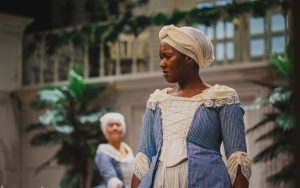Theatre Review: ‘The Women of Llanrumney’ @ Stratford East, London

House slave, Annie (Suzanne Parker) considers herself fortunate and protected working on the Llanrumney estate; a sugar plantation in 18th Century Jamaica, owned by the Morgan family from Wales. She’s convinced that she’s become a ‘true confidante’ to her dissolute mistress, Elisabeth Morgan (Nia Roberts), hence securing a future miles away from the auction block. Like her mistress, Annie has Morgan blood running through her veins but with none of the privileges. Loyal to a fault, Annie has seemingly imbibed the supremacist dogma of her slavemasters, looking down on the field hands and other dark-skinned slaves such as her new colleague, Cerys (Shvorne Marks). The younger woman turns up at Llanrumney heavily pregnant and claiming to be Annie’s daughter.
Shortly after Cerys’ arrival, Elisabeth learns from a competitor, Simon Taylor (Matthew Gravelle) that her soil is diseased. The combination of a failing crop and Morgan’s reckless lifestyle means she is on the brink of bankruptcy. Elisabeth is desperate to avoid selling to Taylor and making an ignominious return to Wales. Also terrified about a fate separated from her mistress, Annie uses what meagre influence she has within the asymmetrical relationship to try and steer the course. Meanwhile, inspired by her free-born African ancestors, Cerys speaks of revolution, privy to the plans of an impending slave uprising. Having witnessed many failed rebellions, Annie is too traumatised to entertain hope. One wants to overthrow the system, the other believes she can work it to her advantage. Neither has time or circumstance in her favour.
Actur and now dramaturg, Azuka Oforka derived the idea for her debut play, The Women of Llanrumney from a visit to the real life Llanrumney Hall in Cardiff. Angered by the site’s erasure of the Morgan family’s implication in slavery, Oforka decided to address this historical omission. ‘…I wanted to write a play that would be a collective reckoning with that history…’, she explains. The production comes to London’s Stratford East Playhouse after an acclaimed run at Cardiff’s Sherman Theatre.
The four-strong cast has formidable chemistry; each standing in their own light without outshining the others. Tracee Ellis-Ross doppelganger, Packer delivers a performance so visceral and physical, it must be exhausting. Elisabeth’s multiple facets are handled well by Roberts. At once cruel, bombastic and pathetic, she’s no caricature villain. Dressed like a lady, yet with a mouth like a sluice and her flame-coloured wig always slightly askew, this stylistic incongruity is symbolic of Morgan’s self-inflicted chaos. The constant, mind-warping soft vs hard power dance between Elisabeth and Annie is equal parts dizzying and riveting, highlighted by Packer and Roberts’ deft dynamic.
Despite having sparse dialogue, Marks nevertheless speaks volumes through Cerys’ looks of incredulity and dismay as she observes Annie oscillate between fawning and persuasion. Granville raids his arsenal of accents to play three roles as distinct as their dialects; white Jamaican slaveholder, Taylor; an Irish indentured servant-turned-wealthy plantation owner, Tommy Flynn and an elderly, self-righteous English plantocrat besotted with Elisabeth, Mr Ainsworth. The interplay between class and the shifting construct of race – embodied in the self-made Flynn – is handled with skilled subtlety. The play also underscores the brutality that enslaved women experienced in particular.
It would be remiss not to mention the beguiling set. Containing genuine artefacts from the original Llanrumney Hall, Stella-Jane Odoemelam’s rendering of a tropical estate from the 1700’s could be a fifth cast-member.
The Women of Llanrumney has a timelessness that will outlast its all too brief Spring 2025 run.
Personnel:
Written by Azuka Oforka
Directed by Patricia Logue
Stella-Jane Odoemelam – Costume & set design
Takisha Sargent – Composer
Aundrea Fudge – Dialect coach
Ndidi John – Wellbeing director
Cast (in alphabetical order):
Matthew Gravelle – Mr Ainsworth, Tommy Flynn and Simon Taylor
Shvorne Marks – Cerys
Suzanne Packer – Annie
Nia Roberts – Elisabeth
The Women of Llanrumney – @ The Theatre Royal Stratford East, London, UK until 12 April
This review was first published on the I Was Just Thinking…blog



